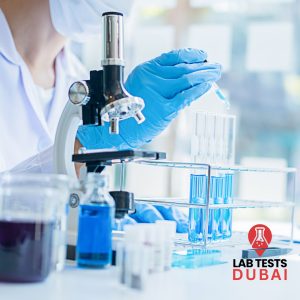
Erythropoietin Blood Test (EPO) – Accurate Lab Testing for Hormone Levels
675,00 د.إ
Erythropoietin lab test is a diagnostic tool designed to measure the levels of erythropoietin, a hormone produced by the kidneys that plays a critical role in red blood cell production.
Sample Type : Serum
Methodology : Chemiluminescence
TAT : 10 Days
Description
Erythropoietin Blood Test (EPO) – Accurate Lab Testing for Hormone Levels
The Erythropoietin (EPO) Blood Test from Lab Tests Dubai is a specialized diagnostic assay that measures levels of erythropoietin, a vital hormone produced primarily by the kidneys that regulates red blood cell (RBC) production in the bone marrow.
EPO is released in response to low blood oxygen levels (hypoxia) and stimulates the bone marrow to produce more RBCs—ensuring adequate oxygen delivery to tissues.
This test is essential for:
- Diagnosing the cause of unexplained anemia (e.g., in chronic kidney disease)
- Investigating polycythemia (high RBC count)
- Evaluating bone marrow disorders
- Monitoring patients on EPO-stimulating agents (ESAs) for anemia
- Detecting EPO-secreting tumors (e.g., renal cell carcinoma, hemangioblastoma)
Using high-sensitivity chemiluminescence technology, this serum-based test delivers accurate results within just 1 day, making it a critical tool for hematologists, nephrologists, and internal medicine specialists.
Available with home blood collection, Lab Tests Dubai ensures fast, accurate, and stress-free testing—so you can get answers quickly and start the right treatment.
Why You Need This Test
If you’re struggling with persistent fatigue, low hemoglobin, or high red blood cells, this test could reveal the underlying hormonal cause.
You need the EPO Test if:
- You have anemia with normal iron but no clear cause
- You’re diagnosed with chronic kidney disease (CKD)
- You have polycythemia vera or secondary polycythemia
- You’re on erythropoiesis-stimulating agents (e.g., epoetin alfa)
- You have a tumor suspected of producing EPO (e.g., renal or cerebellar tumors)
- You’re being evaluated for bone marrow failure or myeloproliferative disorders
EPO levels help differentiate:
- Renal anemia (low EPO due to kidney failure)
- Anemia of chronic disease (inappropriately normal/low EPO)
- Primary polycythemia (low EPO in polycythemia vera)
- Secondary polycythemia (high EPO due to hypoxia or tumor)
This test is not just about numbers—it’s about finding the root cause.
Symptoms That Indicate This Test
Consider the EPO Test if you experience:
✅ For Anemia (Low EPO):
- Persistent fatigue or weakness
- Pale skin
- Shortness of breath on exertion
- Dizziness or lightheadedness
- Cold hands and feet
✅ For Polycythemia (High EPO):
- Headaches, dizziness, or blurred vision
- Reddish face or hands
- Itching after shower (aquagenic pruritus)
- Swelling or pain in limbs (clot risk)
- High blood pressure
✅ For Kidney or Tumor-Related Causes:
- Known chronic kidney disease
- History of renal or brain tumors
- Sleep apnea (chronic hypoxia → high EPO)
These signs may point to abnormal red blood cell regulation—and this test helps determine why.
Natural Production: How EPO Regulates Oxygen Delivery
Erythropoietin is a glycoprotein hormone produced mainly by peritubular cells in the kidneys (90%), with a small amount from the liver.
It works by:
- Binding to EPO receptors on bone marrow stem cells
- Stimulating RBC precursor proliferation
- Increasing hemoglobin and oxygen-carrying capacity
EPO is regulated by oxygen levels:
- Low O₂ (e.g., high altitude, CKD, lung disease) → ↑ EPO
- High O₂ or excess RBCs → ↓ EPO
Normal EPO Range (Approximate):
This test helps distinguish primary vs. secondary causes of blood disorders.
What Happens If Untreated? Risks of Ignoring EPO Imbalance
Ignoring abnormal EPO levels can lead to:
⚠️ Severe Anemia – fatigue, heart strain, cognitive decline
⚠️ Cardiac Complications – high-output heart failure from chronic anemia
⚠️ Blood Clots & Stroke – from untreated polycythemia
⚠️ Tumor Progression – if EPO-secreting tumor is missed
⚠️ Ineffective Treatment – giving iron or ESAs without diagnosis
The good news? Most causes are treatable with:
- EPO injections (for CKD-related anemia)
- Phlebotomy or medication (for polycythemia)
- Treating underlying hypoxia or tumor
Early testing = earlier diagnosis, better outcomes.
How to Prepare for the Test
To ensure accurate results:
✅ No fasting required
✅ Continue your regular medications—but inform your doctor
✅ Avoid smoking or high-altitude exposure before testing (alters O₂ levels)
✅ Inform your doctor if you have:
- Chronic kidney or lung disease
- Polycythemia or anemia
- Are on ESA therapy (e.g., Eprex, NeoRecormon)
A serum blood sample is collected via standard draw—available at our labs or via home collection.
Test Overview: High-Sensitivity Chemiluminescence Method
Note: EPO levels must be interpreted with CBC, iron studies, creatinine, and clinical context.
Results are reported with reference ranges and clinical notes.
Benefits of the EPO Blood Test
🔹 Pinpoint Anemia Causes
Differentiate between renal, inflammatory, or bone marrow-related anemia.
🔹 Guide Treatment Decisions
Determine if EPO therapy is needed or contraindicated.
🔹 Detect Hidden Tumors
Identify EPO-secreting cancers before they progress.
🔹 Monitor Polycythemia
Help distinguish polycythemia vera from secondary causes.
🔹 Optimize Kidney Disease Management
Track EPO deficiency in CKD patients for timely intervention.
If you’re tired of feeling weak, short of breath, or battling unexplained blood results, the Erythropoietin (EPO) Test gives you the answers you need in just 1 day.




Reviews
There are no reviews yet.